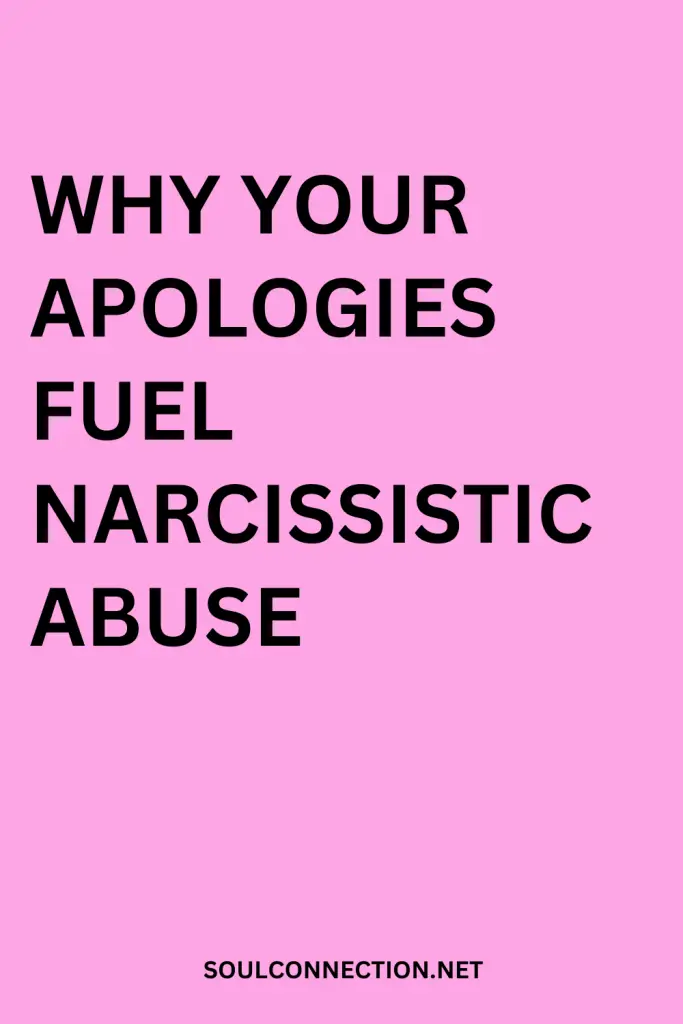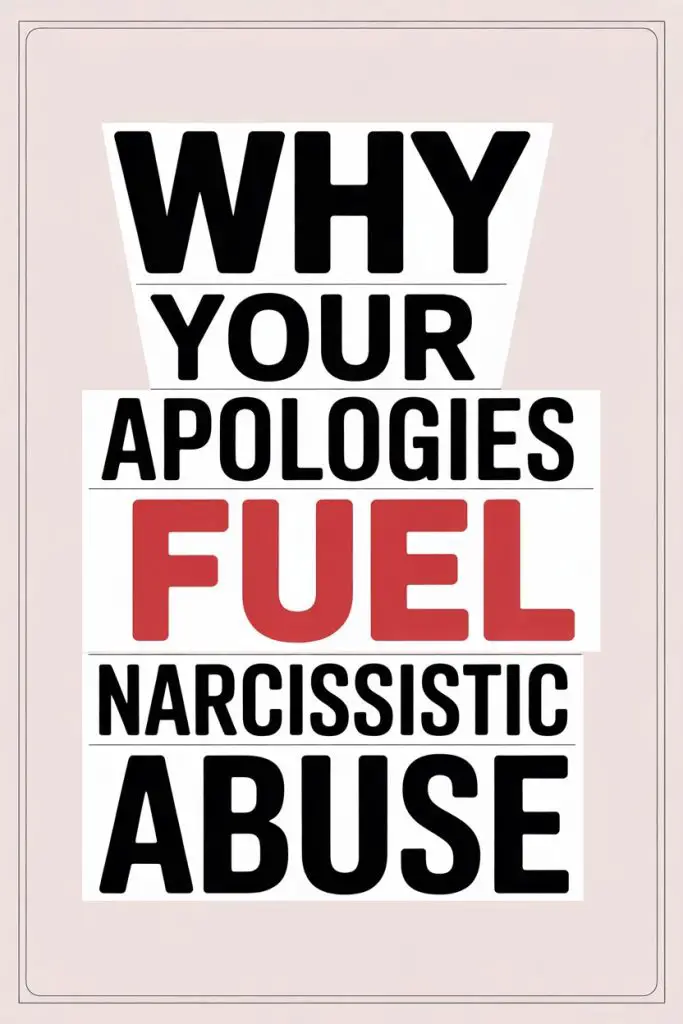Apologizing is supposed to smooth things over and help two people reconnect. But when you’re dealing with a narcissist, those heartfelt sorries can backfire faster than a boomerang in a wind tunnel.
If you’ve noticed your apologies seem to make things worse, not better, you’re not imagining it. There’s a method to the madness—let’s call it narcissist arithmetic: your remorse plus their ego equals trouble.
How Narcissists Twist Your Good Intentions
A sincere apology, in a healthy relationship, is a sign of emotional maturity. You’re taking responsibility, showing vulnerability, and inviting connection.
In a relationship with a narcissist? Your apology becomes a tool. Not for healing, but for them to rewrite the rules in their favor.
For someone high on narcissistic traits, your willingness to apologize isn’t a cue to meet you halfway. It’s a signal they can push boundaries, dodge accountability, and keep you perpetually on the back foot.
Narcissists are masters at taking a simple, honest “I’m sorry” and performing an emotional sleight of hand. Suddenly, you’re apologizing for things you didn’t do—or for simply reacting to their bad behavior.
The Guilt Trip Express
Ever noticed how quickly your apology shifts the whole conversation? One minute you’re upset because they snapped at you, and the next, you’re apologizing for being “sensitive.” How did that happen?
Narcissists excel at flipping the script. The more you apologize, the more “proof” they gather that you are at fault.
This isn’t a fair exchange of feelings; it’s a guilt trip with them in the driver’s seat, and you’re along for the ride, paying the tolls with your self-esteem.
The next time you apologize, watch for that subtle smile or sigh of satisfaction. It’s not relief—it’s victory. You’ve handed them the power stick. Suddenly, your needs and feelings are buried under a fresh heap of guilt.
Apologies as a Power Source
Power. That’s the real currency in a narcissistic relationship. When you say sorry, you’re not just admitting you’ve messed up.
You’re admitting, in their eyes, that you are less than—less perceptive, less stable, less worthy. Each apology is logged, mentally or literally, and used as ammunition for future arguments.
It’s a cycle that can leave you feeling like you’re always a step behind, constantly trying to earn a forgiveness that never truly comes. The more you apologize, the less your needs matter.
Congratulations, you’re now playing a rigged game.
The Tricky Trap of Keeping the Peace
You might find yourself apologizing just to stop an argument before it starts. Maybe you say sorry for things you didn’t even do, because it’s faster than bracing yourself for another emotional cyclone.
That feels pragmatic in the moment, but the long-term cost is steep.
Each “peacekeeping” apology teaches the narcissist that you’ll tolerate their behavior to avoid conflict. Instead of de-escalating, you’re actually setting the stage for more of the same.
Why would they change when you’re the one always backing down? (Spoiler: they won’t.)
Why Narcissists Rarely Apologize Back
Here’s the fun bit: narcissists avoid apologizing like it’s a tax audit. To them, apologies are admissions of imperfection, and that just won’t do.
If they ever do mumble out a “sorry,” it’s often paired with a non-apology like “I’m sorry you feel that way”—translation: “Your feelings are the problem, not my actions.”
You’ll notice a pattern: you apologize, they don’t. Not really. The imbalance grows, and your self-worth quietly shrinks.
The Apology-Forgiveness Black Hole
Once you’re in the habit of apologizing for everything, you might notice forgiveness is never really offered in return. No matter how sorry you are, the issue lingers.
They keep bringing up your “failures” as evidence for why you’re the problem.
Instead of a clean slate, it’s a growing rap sheet. Your apologies don’t clear the air; they thicken the fog. You’re stuck in an endless loop of “I’m sorry”—and they’re never quite satisfied.
Apologizing and the Erosion of Boundaries
Repeated, unearned apologies don’t just bruise your ego; they bulldoze your boundaries. Every time you say sorry for something you didn’t do, you teach yourself to accept less respect and more mistreatment.
The edges of what’s okay and what isn’t begin to blur.
Before long, you’re apologizing for having needs, for expressing normal emotions, or for simply existing in a way that doesn’t cater to their whims. That’s not humility—it’s self-erasure. Narcissists love this. Less resistance, more control.
How to Reclaim Your Apology Superpower
No one’s suggesting you become the “never apologize” villain. But consider this: your apology should be a rare, precious commodity—not a buy-one-get-five-free voucher.
The next time you feel the urge to apologize, pause. Did you actually make a mistake? Are you sorry for your actions, or just for upsetting someone who makes you feel like you’re always wrong? If it’s the latter, take a beat.
Try validating your own feelings first. “I’m upset because I felt dismissed,” is very different from “I’m sorry I got upset when you ignored me.” One honors your experience; the other hands them the crown.
Building Boundaries That Can Take a Hit
Boundaries aren’t about being cold or cruel. They’re about self-respect. Start with small steps. Instead of apologizing, try statements like:
- “I need a minute to think.”
- “That didn’t feel great to me.”
- “Can we talk about what just happened?”
These shift the dynamic. You’re not denying responsibility if you genuinely mess up, but you’re refusing to accept blame as a default setting.
Expect pushback. Narcissists are not known for rolling out the red carpet for your newfound assertiveness. But you’re worth the discomfort that comes with reclaiming your voice.
The Power of the Non-Apology
Sometimes, the healthiest thing you can do is not apologize—especially for things that aren’t your fault. That might feel awkward at first, especially if you’ve been conditioned to keep the peace at all costs.
Watch what happens when you don’t rush to smooth things over. It can feel like standing in a storm without an umbrella, but over time, you build resilience—and the narcissist loses one of their favorite weapons.
When You Really Do Mess Up
Nobody’s perfect, and genuine mistakes happen. In healthy relationships, apologies are powerful—they connect, soothe, and heal. With a narcissist, even the most heartfelt apology can be twisted.
If you must apologize, keep it short and simple. Don’t over-explain, don’t grovel, and don’t accept blame for all the world’s ills.
Example: “I’m sorry for raising my voice earlier.” Full stop. No “I’m sorry I’m such a terrible person,” or “I’m sorry for being so emotional.” Just the facts.
If they try to drag you into a shame spiral, resist the gravity. You’ve owned your part. That’s enough.
What Happens When You Stop Apologizing
The moment you stop feeding the apology machine, you force a change.
The narcissist might escalate their tactics—cue the silent treatment or dramatic sulking. Or they might double down on blame.
Stay calm. You’re not responsible for their feelings, only your own actions. There’s strength in refusing to play a rigged game.
You may notice you feel lighter, more in control, maybe even a little fierce. That’s not just a fluke—it’s what happens when you reclaim your self-respect.
When to Get Outside Help
If you’re stuck on the hamster wheel of endless apologies and it’s taking a toll on your mental health, you don’t have to face it alone.
Reaching out to a therapist, coach, or support group can give you the tools—and courage—to set boundaries and stop the cycle.
A neutral third party can help you spot gaslighting and manipulation, and remind you that your feelings are valid. Sometimes, just hearing “You’re not crazy” is the greatest gift.
Moving Forward Without the Guilt
Apologies have their place. But with a narcissist, they’re often used against you instead of creating connection.
If you’re always saying sorry and never getting the same in return, it’s time to stop handing out free passes for bad behavior.
Start small. Speak up for yourself. Hold your head high. And remember: your worth was never meant to be measured by your willingness to shrink.
If you’re tired of fueling the narcissist’s fire with your good intentions, try stepping back—and watch how the game changes when you play by your own rules.


